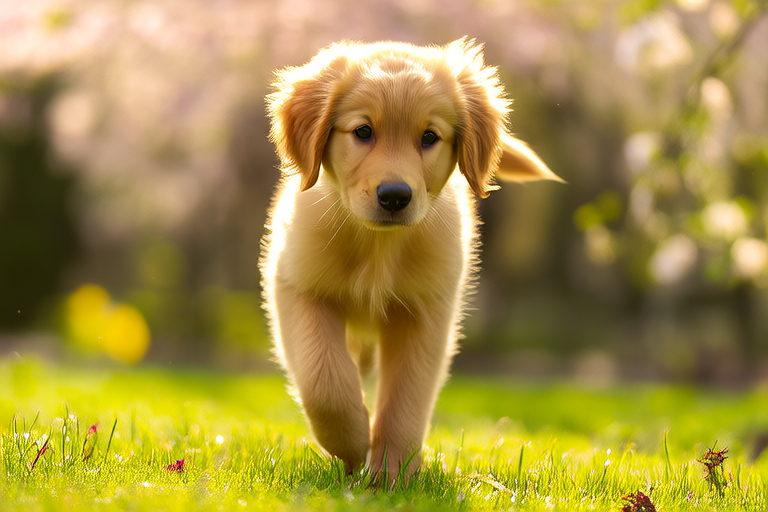Golden Retriever Adventures: From Puppyhood to Senior Years
Introduction:
Welcome to the wonderful world of Golden Retrievers, a breed renowned for their friendly nature, intelligence, and loyalty. In this comprehensive guide, we’ll explore the journey of these beloved dogs from their playful puppyhood through their active adult years to their serene senior stages. Whether you’re a seasoned dog owner or considering adopting your first Golden Retriever, this article will provide valuable insights and practical advice to ensure a rewarding and fulfilling experience.
Puppyhood: The Playful and Energetic Beginnings
The early days of a Golden Retriever’s life are marked by boundless energy and curiosity. These puppies are bundles of joy, eager to explore their surroundings and form strong bonds with their human companions. Their playful demeanor is one of the many reasons why Golden Retrievers are often referred to as the ‘clowns’ of the canine world.
Early Training and Socialization:
Training a Golden Retriever puppy starts with basic commands like sit, stay, come, and heel. Positive reinforcement techniques, such as treats and praise, are highly effective. Puppies learn best when sessions are short but frequent, typically lasting about 10-15 minutes several times a day. Consistency is key; use the same command words and hand signals each time to avoid confusion.
Socialization is equally important. Expose your puppy to various environments, people, and other animals to foster confidence and good behavior. Early socialization helps prevent behavioral issues later on. Puppy classes are a great way to start, offering structured learning and controlled interactions with other dogs.
Common Behaviors:
Golden Retriever puppies are known for their enthusiasm and sometimes over-exuberance. They may jump up to greet people, which can be endearing but also challenging if not addressed early. Teaching them to sit before greeting is a useful trick that helps manage this behavior. Another common behavior is chewing. Providing appropriate chew toys and redirecting them when they attempt to chew on inappropriate items can save furniture and teach them what is acceptable.
Adulthood: A Loyal Companion and Family Member
As Golden Retrievers mature, they become steadfast companions, deeply integrated into family life. Their adaptability makes them excellent pets for households with children or other pets.
Role in Families:
Golden Retrievers thrive on attention and affection, making them ideal companions for families. They are patient with children and can engage in various activities, from fetch games to long walks. Their gentle nature and protective instincts make them natural guardians, always ready to offer comfort and support.
Health Maintenance:
Regular veterinary check-ups are essential for maintaining a Golden Retriever’s health. Common health issues include hip dysplasia, elbow dysplasia, and certain types of cancer. A balanced diet rich in nutrients, regular exercise, and routine vet visits can help mitigate these risks. Dental care is also crucial; brushing your dog’s teeth regularly and providing dental chews can prevent periodontal disease.
Typical Activities:
Adult Golden Retrievers enjoy a wide range of activities. Swimming is particularly popular due to their water-loving tendencies. Fetch games are another favorite, as they stimulate both body and mind. Additionally, agility courses and obedience trials offer mental challenges and physical exercise, enhancing their skills and strengthening the bond between dog and owner.
Senior Years: Slowing Down with Grace and Comfort
As Golden Retrievers enter their senior years, their activity levels naturally decrease, and their needs change. It’s a time for slowing down but not necessarily stopping the fun.
Slowing Down:
Senior Golden Retrievers may require shorter walks and more frequent rest periods. Adjusting the intensity and duration of their exercise routines ensures they remain comfortable and healthy. Mental stimulation remains important, though quieter activities like puzzle toys and gentle games can be more suitable.
Health Concerns:
Arthritis and joint pain are common in older Golden Retrievers. Managing these conditions involves weight management, joint supplements, and possibly medication prescribed by a veterinarian. Regular vet visits become even more critical to monitor their overall health and address any emerging issues promptly.
Providing Comfort and Love:
During this phase, extra attention and care are necessary. Creating a cozy sleeping area with soft bedding and ensuring they have easy access to food and water can significantly improve their quality of life. Spending quality time with your senior dog, whether through gentle petting, soothing massages, or simply sitting together, provides emotional support and reassurance.
Personal Anecdote:
I remember my own Golden Retriever, Max, transitioning into his senior years. Despite the slower pace, he remained an integral part of our family. His wagging tail greeted me every morning, and his gentle presence brought warmth and comfort. We adjusted our walks to shorter distances but made sure they were enjoyable. Max’s golden fur became slightly thinner, and his joints required more care, but his spirit never wavered. He continued to brighten our lives until his final days.
Conclusion:
From their playful puppyhood to their loyal adulthood and serene senior years, Golden Retrievers offer a lifetime of joy, companionship, and unconditional love. Understanding and meeting their needs at each stage of life ensures they lead happy, healthy, and fulfilling lives. Whether you’re welcoming your first Golden Retriever or celebrating many years with an old friend, cherish every moment of their unique journey. With proper care, training, and love, your Golden Retriever will be a cherished member of your family for years to come.
